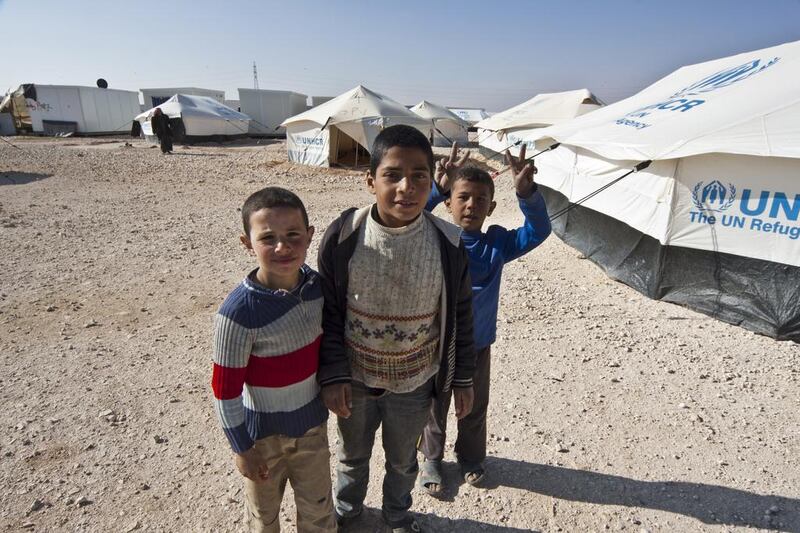In one of the thousands of tattered tents in the Zaatari refugee camp in Jordan, the third-largest in the world, a mother who fled the Syrian civil war tends to her three sick children. They have thalassaemia and she is injecting them with medicine. After that, she also covers their wounds with old nappies. It’s one of the many sights of destitution that the Dubai-based Emirati Muna Harib Al Muhairi will never be able to erase from her memory.
“The procedure is supposed to be done in a hospital, but she did not have the means,” says Al Muhairi, who met some of the refugees on her first trip to the camp in May last year. “I was looking at her and thought: all she needed was US$20 [Dh73.5] to do this each week, which we probably spend in one day.”
Disturbed by the media’s desensitised approach to covering war, Al Muhairi first decided to visit the Zaatari camp with the intention of documenting victims’ stories, which are often concealed behind the staggering statistics of casualties. And thus Breathing Numbers was born, real stories documented in the form of images. The title was inspired by her “constant frustration of watching the news and wondering who’s behind the statistics and numbers of victims”.
“When you watch the news you end up reaching a level where you don’t realise anymore that those numbers represent human beings; this is something most of us are guilty of. It isn’t really our fault, but it is more like a brainwashing mechanism because the numbers keep repeating.
“Bearing in mind that I’m not a director, writer or photographer, all I wanted to do was to show the reality of those people,” continues Al Muhairi, who heads the internal communications department at Taqa, the Abu Dhabi National Energy Company. After witnessing the plight of the refugees, she couldn’t help but intervene: “Telling their stories wasn’t enough – there were immediate needs that had to be addressed.”
According to the UN High Commission on Refugees (UNHCR), more than 107,000 Syrian refugees are registered at the camp, based at Mafraq on the Syria-Jordan border. About 1,000 people arrive daily.
“The first few days in the camp were tough and scary. People dying, diseases spreading; I did not know anyone,” says Al Muhairi.
She connected with the social activist Mahmoud Sadaka, a Palestinian who helped set up Breathing Numbers as an aid and volunteer-based project.
Through social media, she began relaying refugees’ stories online to drum up help in meeting their basic needs. The response was beyond her expectations.
“The documentary expanded into helping a few medical cases, with the support of my family and friends. The first six months I was working along with Mahmoud. We made necklaces – Breathing Numbers Peace Necklaces – to raise funds and cover the expenses,” says Al Muhairi, who now spends every other weekend in Jordan.
The project began attracting attention, with government entities and corporations in the UAE expressing interest in backing her.
As volunteer numbers grew, a campaign was begun to provide blankets and heaters before the onset of winter last year. Her team of 50 volunteers, divided between Jordan and the UAE, distributed 3,000 items of winter clothing for children, 1,200 blankets and about 200 heaters among the refugees.
But improving the living conditions there is a struggle, with several families crammed into one tent.
Their biggest ongoing project is delivering caravans – mobile homes to replace the camp’s tents. Each caravan cost Dh8,625 and are sourced from Jordanian suppliers. Al Muhairi collected funds from family and friends, and 265 caravans were delivered to the camp in December and January, set up with the assistance of the Red Crescent. They plan on delivering another 50 caravans this month. The one-room unit can house five members and is wired for electricity.
“They need a more sturdy settlement,” says Al Muhairi. “In winter the whole place is flooded and people were living in a pool of water. And in summer it is too hot to be in the tents. We want to send 5,000 caravans and we are moving gradually towards that goal.”
Al Muhairi’s team works with different volunteer groups and organisations to identify cases and have received authorisation to assist in the Zaatari camp, as well as on medical cases in Amman and Al Zarqa.
“We target people who do not have any other support, no UN card [signifying refugee status] or are not registered with other organisations.
“The medical cases run in hundreds. I have sheets and sheets of those urgent cases. We have opened an account with the Italian Hospital in Amman and they look into the cases we recommend.”
Al Muhairi says she wants to expand the initiative to other conflict zones around the world.
“It is not about the mass movement and doing big campaigns,” she says. “We want to help each individual who needs us. “At the same time we want to continue to tell their stories to motivate others to be hands-on in assistance.”
• Visit www.facebook.com/BreathingNumbers for more information, or follow Twitter @Breathing_N
aahmed@thenational.ae





